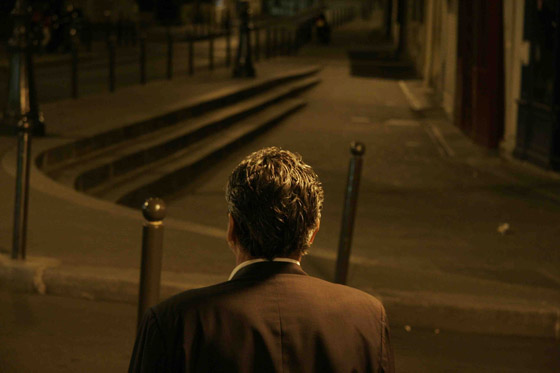The Decade in Review | Andréa Picard
A decade of remembering (or, Avant que j’oublie) Literally. Or the fear of forgetting. From Godard’s elegiac Éloge de l’amour (an anguished apologia for the ramshackle installation to come—another of the decade’s most memorable moments strewn amid the ruins of abandoned thought), perhaps the most poignant and prescient statement of the ‘00s (one plus one), not only for cinema and celluloid (like the unworldly, threatened, twilight beauty of Tacita Dean’s Kodak [2006]) but for Western civilization as it once was, culture and humanity writ large; a 40-year sequel to Pierrot le fou (1965), where ideas and words flout, flounder, flourish, flirt, with the windshield wipers still pathologically ticking back and forth, as the sea draws us in with the crashing of Courbet’s waves harbouring “le naufrage d’un sourire”, a shipwreck, or a ruin. What will youth bring, this Juventude em marcha? Les jeunes, Gilbert Jeune, tickets déjeuner, etc…the idea of starvation stuck to the window of a restaurant as an image of Simone Weil, solemn and resigned fills the screen. It’s an odyssey for Edgar (Degas, and all the others), who may or may not arrive at a joyless happiness (as predicted by Max Ophüls) when the quest of an origin is necessarily the origin itself. Memory. A lesson from Bergson, Godard, or Straub. “There can be no resistance without memory and humanism”: Peter Watkins’s gritty, muddy Brechtian costume bath La Commune (Paris, 1871); Danièle Huillet and Jean-Marie Straub’s final, breathtaking collaboration of resistance in the midst of collaboration in L’itinéraire de Jean Bricard (2008), with memorial plaques resting amid tall grasses, like the rain-soaked commemoration fountains in Éloge’s already bygone Paris, or the numerous civil rights and labour movement markers masquerading officiously across the US in Profit motive and the whispering wind (2007).
And love? Three Times. The sheen and shimmer of Shu Qi’s turquoise pant leg, the lacquered, cloistered world of a turn-of-century brothel glimmering by candlelight and the epileptic fits of a bisexual goth singer, whose past lives amount to a “creature that exists because of the memories of others,” like the wild cat in Apichatpong’s quietly brazen Tropical Malady. More love. As in Syndromes and a Century, where family memories form the basis of something magical, nearing myth and make-believe. Oxhide I and II (reality TV with no trace of TV, depicting the real-time handmaking of leather satchels and green-onion infused dumplings) is the family saga one hopes to see live on for an eternity and a day. There was love as memory in Le genou d’Artemide (2007), and the triumph of love everlasting in Le streghe, femmes entre elle (2009), Irène (2009), and Les plages d’Agnès (2008); the pain and tumult of it all in Je rentre à la maison (2001), L’Anglaise et le duc, Ne touchez pas la hache (2007), Everyone Else, Millennium Mambo (2001) (the kids are not okay) and Café Lumière (the kids are okay).
Through brittle, embattled transition and contemporary wreckage (Still Life; 24 City; Alexandra, 2007; Lazarescu), drugs, decay and demolition (In Vanda’s Room, Colossal Youth, Police, Adjective), environmental sublimation (care of James Benning, Peter Hutton, and Lisandro Alonso), memory returns to the fore over and over again. A jigsaw of remembrance of time past, of time collapse, ellipses, fissures, of soot-dusted haze (Platform; La captive, 2000; Les amants réguliers, 2005; Los muertos, Gerry, 2002; The Headless Woman, 2008; Eccentricities of a Blond-Hair Girl, 2009) that, in many instances, reminded us why Eglantine left Perceval. Rohmer, of course, always knew why.
Where once decried for its slight, simplicity, “le bleu du ciel,” which gave Anna Karina’s Marianne an extra spring in her carefree step, at last receives its ode now that the “time of sayings” is long over (“c’est fini le temps des phrases”). Words are no longer words; they float in limbo, somewhere between meaning, SMSes and silence—the latter a call to the wild of tradition (say, more Pickpocket than Matrix). To hearken back to the elemental, to the sky and sea, to the expanding, bottomless abyss that concludes Jacques Nolot’s wrenching, writhing, and naked Avant que j’oublie (2007), a black sphere that contains life, death and everything in between, and swallows up the screen like a conflagration of extinction. It was a decade of requiems, for love, memory, the cinema (Goodbye, Dragon Inn) and the cruel ordinariness of time’s passing.
Andréa Picard is programmer at TIFF Cinematheque, curator of Wavelengths at the Toronto International Film Festival, and a regular contributor to Cinema Scope.



